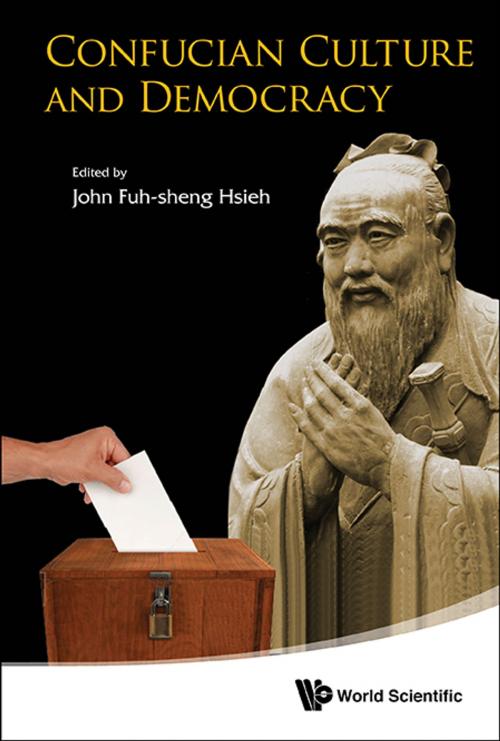Confucian Culture and Democracy
Nonfiction, Social & Cultural Studies, Political Science, Government, Democracy, International| Author: | John Fuh-sheng Hsieh | ISBN: | 9789814596404 |
| Publisher: | World Scientific Publishing Company | Publication: | October 10, 2014 |
| Imprint: | WSPC | Language: | English |
| Author: | John Fuh-sheng Hsieh |
| ISBN: | 9789814596404 |
| Publisher: | World Scientific Publishing Company |
| Publication: | October 10, 2014 |
| Imprint: | WSPC |
| Language: | English |
The debate over the compatibility of Confucian culture with democracy is an ongoing one. Yet, few books in the existing literature have dealt specifically with the relationship between Confucian culture (as opposed to Confucianism or general cultural factors) and democracy. Prior to the end of the Second World War, no Confucian society was democratic, so the debate could only be done in an abstract sense. Only after the war did Japan emerge as a democratic country, and it is not a perfect case of the Confucian culture — for one, its Confucian legacy is diluted; moreover, its postwar transition to democracy was, to a large extent, externally imposed rather than internally generated. In the late 1980s and early 1990s, South Korea and Taiwan joined what Samuel P Huntington termed the “third wave of democratization”. Finally, at least two societies with strong Confucian heritage turned democratic, and unlike Japan, their democratic transition resulted mainly from internal political dynamics.
Confucian Culture and Democracy represents a comprehensive effort to examine the linkages between Confucian culture and democracy. Building on the empirical evidence from South Korea and Taiwan, and examining semi-democratic societies with extensive experiences in electoral politics like Singapore and Hong Kong, this book provides readers with an empirical and detailed coverage of democratization and democratic governance in various Confucian societies. Japan — as a country influenced by Confucianism, is also analyzed, together with China — whether China joins the family of democratic states is undoubtedly an important concern for many in the region and beyond.
Contents:
- Introduction: Democracy, Confucian Style? (John Fuh-sheng Hsieh)
- Protest Confucianism and Postwar Japanese Democratic Practice (John A Tucker)
- Identity and Democratic Values in Divided Taiwan (I-chou Liu and Kuang-hui Chen)
- The Political Logic of Public Policymaking in Democratizing Taiwan (Joseph Wong)
- Adaptations in Korea: Confucianism, Democracy, and Economic Development (John Kie-Chiang Oh)
- The Politics of Confucianism and Asian Values in Singapore (Lam Peng Er)
- Confucianism and Pluralism in a Meritocratic Society: The Singapore Case (Thomas J Bellows)
- Confucian Values and Democratic Governance in Hong Kong (Joseph Y S Cheng)
- Changes in Political Values in Mainland China Since the 1990s: Evidence from Surveys (Gang Guo)
- On Local Governance in China: From Feudalism, Centralized Bureaucracy, to Self-Governance (Emerson M S Niou)
Readership: Undergraduates, postgraduates, researchers, academics, and policymakers interested in international relations in the Asia-Pacific region, as well as those interested in political culture, democratization, and democratic governance in East Asia.
Key Features:
- One of the few books that specifically dealt with the relationship between Confucian culture and democracy
- Empirical and comprehensive case studies that cover both democratization and democratic governance in various Confucian societies (South Korea, Taiwan, Japan, Hong Kong, Singapore, China)
- Written by prominent scholars in the field
The debate over the compatibility of Confucian culture with democracy is an ongoing one. Yet, few books in the existing literature have dealt specifically with the relationship between Confucian culture (as opposed to Confucianism or general cultural factors) and democracy. Prior to the end of the Second World War, no Confucian society was democratic, so the debate could only be done in an abstract sense. Only after the war did Japan emerge as a democratic country, and it is not a perfect case of the Confucian culture — for one, its Confucian legacy is diluted; moreover, its postwar transition to democracy was, to a large extent, externally imposed rather than internally generated. In the late 1980s and early 1990s, South Korea and Taiwan joined what Samuel P Huntington termed the “third wave of democratization”. Finally, at least two societies with strong Confucian heritage turned democratic, and unlike Japan, their democratic transition resulted mainly from internal political dynamics.
Confucian Culture and Democracy represents a comprehensive effort to examine the linkages between Confucian culture and democracy. Building on the empirical evidence from South Korea and Taiwan, and examining semi-democratic societies with extensive experiences in electoral politics like Singapore and Hong Kong, this book provides readers with an empirical and detailed coverage of democratization and democratic governance in various Confucian societies. Japan — as a country influenced by Confucianism, is also analyzed, together with China — whether China joins the family of democratic states is undoubtedly an important concern for many in the region and beyond.
Contents:
- Introduction: Democracy, Confucian Style? (John Fuh-sheng Hsieh)
- Protest Confucianism and Postwar Japanese Democratic Practice (John A Tucker)
- Identity and Democratic Values in Divided Taiwan (I-chou Liu and Kuang-hui Chen)
- The Political Logic of Public Policymaking in Democratizing Taiwan (Joseph Wong)
- Adaptations in Korea: Confucianism, Democracy, and Economic Development (John Kie-Chiang Oh)
- The Politics of Confucianism and Asian Values in Singapore (Lam Peng Er)
- Confucianism and Pluralism in a Meritocratic Society: The Singapore Case (Thomas J Bellows)
- Confucian Values and Democratic Governance in Hong Kong (Joseph Y S Cheng)
- Changes in Political Values in Mainland China Since the 1990s: Evidence from Surveys (Gang Guo)
- On Local Governance in China: From Feudalism, Centralized Bureaucracy, to Self-Governance (Emerson M S Niou)
Readership: Undergraduates, postgraduates, researchers, academics, and policymakers interested in international relations in the Asia-Pacific region, as well as those interested in political culture, democratization, and democratic governance in East Asia.
Key Features:
- One of the few books that specifically dealt with the relationship between Confucian culture and democracy
- Empirical and comprehensive case studies that cover both democratization and democratic governance in various Confucian societies (South Korea, Taiwan, Japan, Hong Kong, Singapore, China)
- Written by prominent scholars in the field















